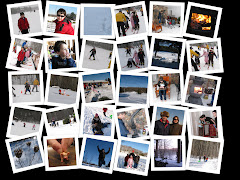I found this information at http://www.turnoffyourtv.com/turnoffweek/TV.turnoff.week.html & http://www.tvturnoff.org/
Every year there is a challenge given to kids (and adults) to turn off their tv and substitute the time spent in front of it with each other.
I am taking this as a personal challenge this week with my family. We turn on that box the second we wake up and unless we are not home, it's on all - day - long.
Now, we do only have the one tv in the family room, so the kids (or the mom and dad) acannot just disapear into the bedrooms to zone out on another program if they are not allowed to watch what they want. BUT, since we use the tv as a crutch to "buy" time for dinner making or difuse a fight or find an alternative to boredom.
Well, for this week, and right now it's just for this week, I want to see how many housrs I can keep that tv off.
This challange for me does not include time when Jim is home with the kids and I am not, which is, oh, all day! I cannot set rules for the events that go on during the week when I am not home, but since I know that you are, or should be, reading this post at some point, Jim, I am strongly encouraging you to leave the tv off this week.
Below is a list of alternatives of things to do when the tv is off. My challenge, to make it fun, is to see how manywe can do together this week.
I will repost the list with an update at the end of the week.
Purpose: To re-think the role of television, why we use it and how and what for. Assess its impact on students, teachers, parents, children,individuals, etc.
How: Simply switch off or unplug your TV set for seven days and engage in a wide range off substitute activities.
Who: Individuals, children, families, students, groups, etc.
Where: In your homes, schools, libraries, businesses, congregations, etc.
INTERESTING FACTS ABOUT TV
- Number of 30-second commercials seen in a year by an average child: 20,000
- Number of minutes per week that parents spend in meaningful conversation with their children: 38.5
- Number of minutes per week that the average child watches television: 1,680
- Percentage of children ages 6-17 who have TV's in their bedrooms: 50
- Percentage of day care centers that use TV during a typical day: 70
- Hours per year the average American youth spends in school: 900 hours
- Hours per year the average American youth watches television: 1500
- Percentage of Americans that regularly watch television while eating dinner: 66
TV-Free America is a national nonprofit organization that was founded in 1994 to raise awareness about the harmful effects of excessive television-watching and encourage Americans to reduce the amount of television that they watch--and replace TV time with activities that lead to more literate, productive lives and engaged citizenship.
National TV-Turnoff Week is the first nationwide effort which targets the medium of television and asks that people reassess the role TV plays in their daily lives as entertainer, pacifier, babysitter, time filler and background noise.
Television is generally a passive "non-activity" which often detracts from more healthy, interpersonal, productive, rewarding and community-oriented activities.
National TV-Turnoff Week is about having more fun and turning "on" your life. It's an opportunity to rediscover the wide range of activities that exist when one unplugs from the sedentary, image-based, simplistic and commercial world of television.
1) "Why turn off the television completely? Can we do it for just one day?"
Turning off the television for seven full days helps participants realize that life without television is not torture and may actually be more fun. A multi-day TV "fast" allows sufficient time for the development of habits likely to be more productive and rewarding. A one day turnoff provides too little challenge.
2) "Is all TV bad? What about the Discovery Channel or PBS?"
All TV is passive, sedentary and non-experiential. Most viewers tend to watch show after show--not individual programs. Instead of watching a documentary about birds, go out (with binoculars if you have them) and see how many real birds you can identify in your neighborhood. The purpose of National TV-Turnoff Week is to leave behind judgements about the quality of television and focus instead on creating, discovering, building, participating and doing.
3) "What about media literacy and teaching critical viewing skills?"
By going without television for a week, people will learn a great deal about their television habits and will likely be more critical viewers if and when they decide to return to the tube. A TV "fast" is a path to media literacy.
4) "I can't give up my programs! Don't interfere in my home!"
Remember that a TV-Turnoff is voluntary and meant to be fun.
It's intended to build family and community spirit. Coordinate your turnoff in a way that does not alienate or offend parents--they already have their hands full! Send a letter to parents that asks for the family's participation in the turnoff. Indicate the support of the principal, the teachers, PTA or other groups that you have. Parents are more likely to sign on if they know that school professionals support the project.
5) "Do we have to plan an activity every night?"
Some organizers feel providing an activity every night doesn't mimic real life and allows for a big letdown after the turnoff, so some people plan just a few. Plan activities that you might consider doing the following week. In-school activities are a possibility also, and most organizers agree it is good to have at least one family activity during the turnoff.
6) "What about the name TV-Free America? Are you advocating the complete eradication of television?"
TV-Free America encourages Americans to watch less television and replace TV time with activities that lead to more productive and rewarding lives. A TV-Turnoff is an effective way to help break the television habit. While it may be unrealistic to think participants will never watch television again (although a few won't), many will regard the medium in a much different way henceforward.
7) "How can we best appeal to teenagers?"
Make the turnoff fun and provocative. Copy and distribute articles and essays about the environmental and social issues surrounding television and have had students debate the opposing views. Some teachers have awarded extra credits to participating students who keep a journal and write an essay about their week without television. Past TV-Turnoff organizers have asked local businesses (theaters, skating rinks, miniature golf courses, bowling alleys, etc.) to offer discounts to students, families and individuals who show a signed TV-Turnoff "Pledge Card."
8) "I need some peace and quiet when I come home. The television occupies the kids while I fix dinner."
Invite the children to help with simple tasks or have them talk with you while you prepare dinner. Developing a few special (and regular) pre-dinner activities and habits for children is a very worthwhile investment. Some parents also find playing with kids for just a few minutes helps relax the kids as well as themselves.
9) "Our neighborhood is unsafe. Better that my kids sit in front of the television at home than risk harm outside."
There are many indoor activities that are fun, productive and TV-free (see list). Work with neighbors or a local community center to develop indoor and outdoor activities for participating families. Point out that neighborhood improvement will never occur as long as residents merely retreat to the fictional, vicarious world of television.
10) "I can't afford the cost of these "substitute" activities!"
There are many free and simple activities (see enclosed lists) sponsored by libraries, environmental groups, museums, universities, etc. Local newspapers, radio stations and community organizations will have listings of free, public events. Outdoor recreation is an activity that is generally free--as well as healthy!
- Volunteer in a school to teach reading, math, computer skills.
- Learn to play the guitar or other musical instrument.
- Attend community concerts.
- Organize a community clean-up.
- Put together a puzzle.
- Visit the library. Borrow a book. Attend library activities.
- Go ice skating or roller skating.
- Listen to the radio.
- Visit the zoo.
- Paint a picture, a mural or a room.
- Attend a high school sporting event.
- Find out about your area's community center or park's activities.
- Go swimming. Join a community swim team.
- Read a book aloud to your younger sister/brother.
- Plan a picnic or barbecue.
- Go bird watching.
- Volunteer for a community organization or charity.
- Play with your pet.
- Go dancing.
- Write a letter to a friend or relative.
- Learn to cook.
- Plant a flower, vegetable or herb garden.
- Read magazines or newspapers.
- Plan a slumber party.
- Start a neighborhood basketball, soccer, or kickball game.
- Go camping (even if it's just in the backyard!).
- Join a choir.
- Go through your closets and clothes. Donate surplus items to Goodwill, the Salvation Army or a local rummage sale.
- Start a diary/journal.
- Go to a museum.
- Take a nature hike. Collect seeds and leaves. Make a collage with the materials you collected and post it on the refrigerator.
- Play cards.
- Start a community exercise group that power walks, runs, or bikes.
- Read a story to your younger brother or sister.
- Get out the family photo album. Research your family history.
- Go listen to a local band.
- Make crafts to give as gifts.
- Make up a story and write it down.
- Learn to say simple phrases in a few different languages.
- Ask an older family member to tell you a story about his or her childhood. Write about it.
- Learn some new riddles or jokes.
- Bake two batches of cookies; one for your family and one for a neighbor.
- Watch the night sky through binoculars; identify the different constellations. Observe the moon.
- Visit a local bookstore.
- Go to a movie with your family or friends.
- Walk to work or school.
- Start a kids bowling league.
- Train for a 5K race.
- Teach a neighbor about a computer program.
- Go fishing.
- Begin a family project.
- HAVE A PARTY TO CELEBRATE A TV-FREE WEEK.









This is awesome. Granted it's already Wednesday ... and I am pretty sure we watched TV on Monday night. Still, very cool and informative. Thanks!
ReplyDeleteyour welcome. we tried this a few times in years past but we always end up caving a day or two into it. the funny part is that on tuesday morning i fliped the tv on in the morning with out even thinking until the kids were like, "MOM". "NO TV!" lol.
ReplyDelete